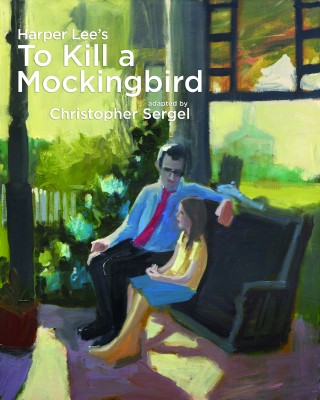
Last night found Mrs. K and I at a second weekend performance of the Indiana Repertory Theatre production of Harper Lee’s To Kill a Mockingbird, which has been adapted for the stage by Christopher Sergel.
Most of us are at least vaguely familiar with the 1960 Harper Lee novel about racial tension and injustice, loss of innocence, and the rewards of integrity. Ms. Lee’s 2015 follow-up novel, Go Set a Watchman, has recently garnered much publicity for the landmark best-seller, which was turned into a film in 1962 starring Gregory Peck as Atticus Finch. The 1990 play is much less famous, but it nonetheless does a wonderful job of showing the conflicts and courage portrayed in the book and the film.
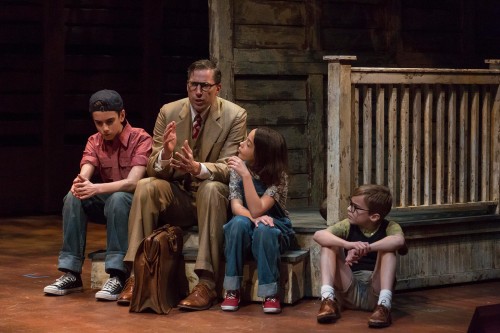
Jem (Grayson Molin), Atticus Finch (Ryan Artzberger), Scout (Paula Hopkins) and Dill (Mitchell Wray) in the IRT’s production of To Kill a Mockingbird.
Director Janet Allen takes a very down-to-earth approach to this iconic American story, employing Bill Clarke’s rough-hewn scenic design as a starting point. She also adds an infusion of traditional music, presented in a gospel hymn to open the show and with dashes of live guitar playing singers providing music beds for transitions and thoughtful monologues. Through the music we are given a feel for the era and for the emotions of the story. Those factors are the basis for this pleasing rendition of memories by Jean Louise Finch, the adult once known as Scout, who narrates the proceedings.
The cast is well chosen. Ryan Artzberger projects a very ordinary countenance as Atticus, which is pleasing. His standing as Maycomb, Alabama’s most upright citizen is shown through actions and deeds and there is the feeling of underplaying the icon at work here. Conversely, Robert Neal is large and ugly and easy to dislike as the villainous Bob Ewell, which is pleasing as well.
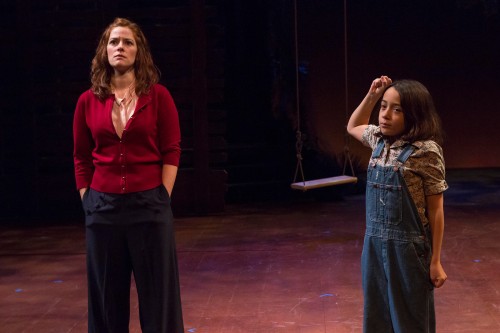
Jean Louise (Lauren Briggeman) and her younger self, Scout (Paula Hopkins) in the IRT’s production of To Kill a Mockingbird.
Lauren Briggeman is a constant reassuring presence as Atticus’ grown daughter, Jean-Louise. Showing us her recollections, she moves us from frame to frame, revealing what lessons she has learned along the way. Her smaller self, Scout, is played by Paula Hopkins, a local 5th grader, who does a nice job with the rudiments of such a large role. Scout’s friend Dill and her brother Jem are also well portrayed by Mitchell Wray (whom I thought showed much promise in his “Velveteen Rabbit” role last season) and Grayson Molin (who is fast becoming an IRT regular).
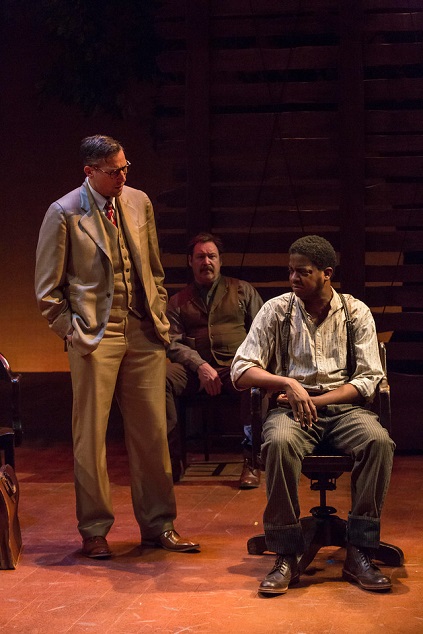
Atticus Finch (Ryan Artzberger), Sheriff Heck Tate (Tim Grimm), and Tom Robinson (Daniel A. Martin) in the IRT’s production of To Kill a Mockingbird.
Other standouts in the large cast include Daniel A. Martin, who finds precise emotional levels for the wrongly accused Tom Robinson; Tim Grimm, whose sheriff Heck Tate is level-headed and righteous; Milicent Wright as the motherly housekeeper, Calpurnia; and Christopher Walz, who provides musical content (along with the aforementioned Tim Grimm), does a turn as Judge Taylor in the Robinson trial, and plays Boo Radley with a touching vulnerability. Also, Katherine Shelton is quite impressive as the victimized daughter of Bob Ewell.
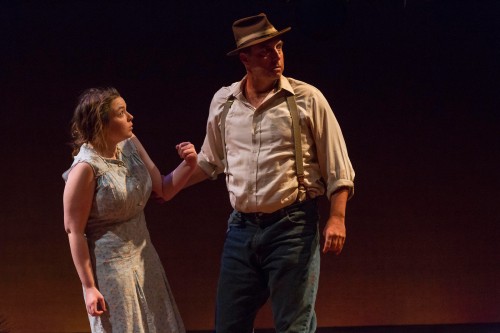
Mayella Ewell (Katherine Sheldon) and Bob Ewell (Robert Neal) in the IRT’s production of To Kill a Mockingbird.
There are some technical issues to address. The two youngest actors, tasked with filling the large auditorium with their unmiked voices, have trouble at times being understood. Part of this, I realize, was my position in the seats – far off to the stage left area, but part also is the basic skill of voice projection which should improve with experience. Knowing the story pretty well helped the situation, but I could have enjoyed the show more with a full understanding of all the lines.
Nonetheless, the play is thoughtfully directed to be so evenly paced and, for the most part – underplayed, that one is drawn into the emotions almost without even realizing it. The sadness felt at the end is something of a surprise in that it is felt so directly placed in oneself. This sadness seems to be both of empathy for the loss felt by the characters as well as a genuine disappointment for the state of mankind. And I think this latter point is perhaps what Ms. Lee was getting at, especially in 1960 America: We need to do better than this – we need to change.
Bottom-line: This is a very worthwhile production of a rather familiar story. Although there are some problems with understanding lines at times, we are treated to a well-crafted endeavor, which I am glad to know 10,000 local school children will be exposed to this month. Kudos for IRT and their outreach to our schools.
To Kill a Mockingbird will continue on the OneAmerica stage at IRT through February 28th. Ticket information can be found by going online at http://www.irtlive.com or by calling the IRT box office at 317-635-5252.
* – Photos by Zach Rosing
**- Banner artwork by Kyle Ragsdale
Feb 06, 2016 @ 23:30:16
Thanks for your insightful review. You may want to correct the spelling of Ryan’s name to “Artzberger”.
Feb 07, 2016 @ 08:12:28
Thanks much for the comments. Will do – on the correction.